Site Search
- resource provided by the Forum Network Knowledgebase.
Search Tip: Search with " " to find exact matches.
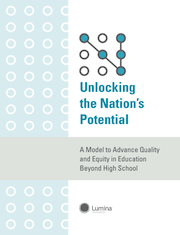
A report from Lumina Foundation and its Quality Credentials Task Force calls for a coordinated national effort to ensure equitable access to quality postsecondary education in the United States.
The report, Unlocking the Nation's Potential: A Model to Advance Quality and Equity in Education Beyond High School (32 pages, PDF), found that the current U.S. system of degrees, certificates, industry certifications, and other credentials lacks a comprehensive definition of quality as well as the kind of up-to-date indicators needed to drive improvements in policies and practices. To help guide efforts that ensure access to high-quality educational opportunities for students of color and advance racially and economically just outcomes, the task force — which includes nearly two dozen education, policy, and workforce development leaders — proposes a model based on a shared understanding of what a quality credential is, as well as institution-based curricular changes and systemic reforms at the federal and state levels.
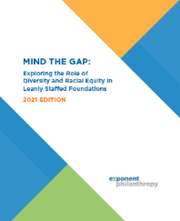
This survey shows a clear relationship between a focus on racial equity and good grantmaking and governance practices. Even though a growing number of funders are focusing on racial equity, foundation boards and staff lack racial diversity. To be powerful allies in the movement for racial equity, leanly staffed foundations must evaluate themselves first.
The benefits of sabbaticals for nonprofit leadership have been well documented. A study of five sabbatical programs over five years shows that sabbaticals not only provide needed respite to nonprofit leaders, they increase organizational capacity, aid succession planning, and strengthen governance.
This weekly conference call series welcomed New Jersey-based grantmakers along with national funders and provided an opportunity for grantmakers to hear from a wide range of experts in the field of disaster philanthropy. This series started on November 5, 2012, one week after Sandy struck New Jersey, and continued through March 25, 2013. The written summaries of each recording are listed below.
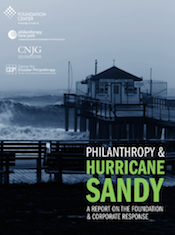
This new report from CNJG and partners examines the response of foundations, corporations, and other institutional donors to the devastation wrought by Hurricane Sandy in October 2012. Numbering nearly 600, these funders have so far committed more than $380 million for relief, recovery and building efforts. The hard data and reflective observations in the report contribute to the growing body of knowledge that helps foundations and corporations be strategic and effective with their giving when disaster strikes.
Two years after the historic storm, Philanthropy & Hurricane Sandy: A Report on the Foundation & Corporate Response breaks down the allocation of dollars contributed thus far and offers perspective on the role of private giving in disaster response and lessons to be taken from this one. The report was published by the Foundation Center in partnership with the Council of New Jersey Grantmakers and Philanthropy New York, and with support from the Center for Disaster Philanthropy.
“Throughout the past two years, our exceptional nonprofit and funder community has taken on challenges they never imagined,” said Nina Stack, president of the Council of New Jersey Grantmakers. “These organizations continue to develop innovative solutions that other communities will learn from and build upon in future disasters.”
In addition to the report’s numerous funders, CNJG wishes to thank the PSEG Foundation for supporting this project.
The New Jersey Economic Development Authority (NJEDA) today announced that it anticipates awarding $14 million in grants to 27 organizations through its Sustain & Serve NJ program. The NJEDA launched applications for Sustain & Serve NJ in late 2020 to support restaurants that have been negatively impacted by the COVID-19 pandemic. The NJEDA expects that the funding announced today will result in the purchase of 1.5 million meals from at least 160 New Jersey restaurants in at least 69 cities in 12 counties.
“New Jersey’s restaurants were hit particularly hard by the COVID-19 pandemic, and the outpouring of interest in Sustain & Serve NJ underscores the community’s desire to help local restaurants and the neighborhoods they serve,” Governor Phil Murphy said. “The positive economic impact of this program for the restaurant industry, combined with the good it will do in the community, makes Sustain & Serve NJ a home run.”
Through Sustain & Serve NJ, the NJEDA anticipates providing $14 million in grant funding to entities throughout the Garden State to support expenses directly tied to bulk purchasing of meals from New Jersey-based restaurants. Each awardee will receive a grant of between $100,000 and $2 million to fund these purchases. The entities will then distribute the meals at no cost.
Advancing its ongoing commitment to ensuring a stable and healthy cultural industry, the New Jersey Cultural Trust Board approved a total of $798,395 in grants supporting capital projects at 21 nonprofit cultural organizations during an open public meeting held virtually Dec. 15. The nearly $800,000 in awards represents the largest total dollar amount the board has approved in grant awards in a single fiscal year since 2011.
With the FY2024 grant awards, the Cultural Trust has now awarded over $10.4 million in funding for historic preservation and financial stabilization projects across New Jersey to date.
“These grants are investments in the sustainability and longevity of sites significant to our state’s rich and diverse history,” Lt. Gov. Tahesha Way, who oversees the Cultural Trust in her capacity as secretary of state, said. “New Jersey’s historic places are essential to our state’s identity and culture, and the Cultural Trust’s Capital Historic Preservation program helps safeguard them for future generations.”
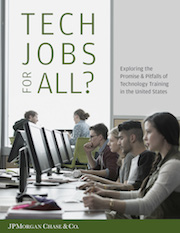
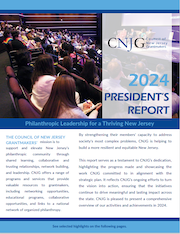
CNJG's President's Reports
The Center for Disaster Philanthropy is proud to partner with Foundation Center, the leading source of information about philanthropy worldwide, to present this interactive dashboard, which provides an analysis of disaster-related funding by foundations, governments, corporations, and individuals. The data presented here illuminate funding trends, expose imbalances in where and when contributions are made, and can help donors make more strategic decisions about their investments in the full life cycle of disasters, including preparedness and recovery efforts.
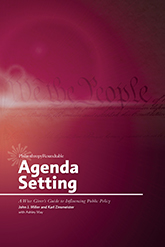
A key objective of the Scaling What Works initiative has been to translate insight and learning from grantmaker intermediaries involved with the Social Innovation Fund and share them with the broader philanthropic community. The fifth guide in the Lessons Learned series presents the benefits and challenges of partnerships between local and national funders, and highlights key considerations for both kinds of funders to foster success in their collaboration.
CNJG is pleased to offer this program to family foundation members as part of NCFP's Fundamentals of Family Philanthropy 2023 webinar series, providing guidance on the core tenets of effective family philanthropy.
A family philanthropy has a much better chance of success if there is an intentional culture that values continuous improvement, feedback and professional development, and an integrated approach of learning and assessment across governance, philanthropic strategy, succession, and more. The assessment process asks organizations to evaluate their philanthropic purpose, governance, team, accountability, finances, and family—to answer how you can continually keep people engaged and excited about this work, and improve on what already exists. This webinar will explore how board and staff can create a learning culture within the philanthropy, different tools to assess the organization internally, and strategies to build assessment and feedback into all facets of the work.
Cost: This event is free for CNJG Members who are family foundations.
Other types of foundations are ineligible to join this webinar.
This program is a CNJG membership benefit for family foundation members, including staff and trustees, in partnership with the National Center for Family Philanthropy.
